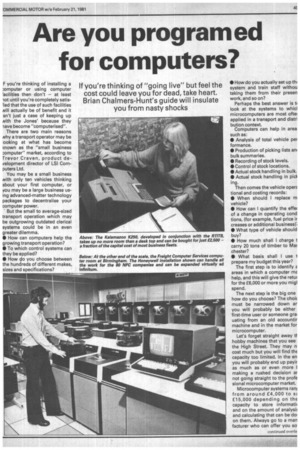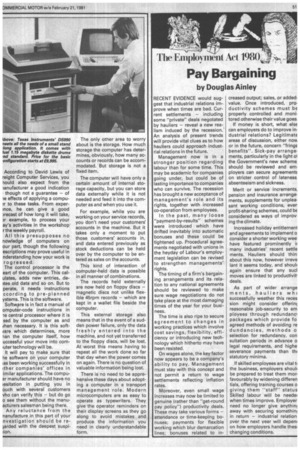Are you programed for computers?
Page 55

Page 56

Page 57

If you've noticed an error in this article please click here to report it so we can fix it.
F you're thinking of installing a ;omputer or using computer 'acilities then don't at least lot until you're completely satisied that the use of such facilities will actually be of benefit and it sn't just a case of keeping up with the Jones' because they lave become "computerised".
There are two main reasons why a transport operator may be ooking at what has become (nown as the "small business .3omputer" market, according to trevor Craven, product development director of LSI Computers Ltd.
You may be a small business with only ten vehicles thinking about your first computer, or you may be a large business using advanced-matter technology packages to decentralise your computer power.
• But the small to average-sized transport operation which may be outgrowing outdated clerical systems could be in an even greater dilemma.
• How can computers help the growing transport operation?
• To which control systems can they be applied?
• How do you choose between the hundreds of different makes, sizes and specifications? • How do you actually set up till system and train staff withou taking them from their presen work, and so on?
Perhaps the best answer is ti look at the systems to which microcomputers are most oftel applied in a transport and distri bution context.
Computers can help in area such as:
• Analysis of total vehicle per formance.
• Production of picking lists am bulk summaries.
• Recording of stock levels.
• Control of stock locations.
• Actual stock handling in bulk.
• Actual stock handling in pick ing.
Then comes the vehicle opentional and costing records: • When should I replace m vehicle?
II How can I quantify the effer of a change in operating cond tions, (for example, fuel price ir creases or additional business)!
• What type of vehicle should buy?
• How much shall I charge t carry 20 tons of timber to Mar chester?
• What basis shall I use I prepare my budget this year?
The first step is to identify a areas in which a computer ME help, and this will give the retur for the £6,000 or more you migl spend.
The next step is the big one how do you choose? The choic must be narrowed down ar you will probably be either first-time user or someone gra' uating from an old accountir machine and in the market for microcomputer.
Let's forget straight away tF hobby machines that you see the High Street. They may n cost much but you will find thE capacity too limited. In the en you will probably end up payir as much as or even more I making a rushed decision ar not going straight to the profe sional microcomputer market.
Microcomputer systems rani from around £4,000 to si £15,000 depending on the capacity to store informatir and on the amount of analysir and calculating that can be doi on them. Always go to a man facturer who can offer you so ware which he has written or can write for his own machine.
Don't buy your computer from one source and its instructions from another. Even less should you buy a computer and then have someone write its software specially.
The manufacturer knows his own computer better than anyone and instructions which program it to handle, say, vehicle service records or trading balance will have been written by a person on the team which designed the machine itself.
Also, if you do need the computer to do a job or provide an analysis which is not already in its program, the cost of the extra software will be lower from the manufacturer.
Good manufacturers can offer -eady-made packages of softpare which will fit your requirements exactly and probably :hrow in a few bonuses you didn't expect — like more comprehensive operational reports. As to the size of the machine, he computer manufacturer ;hould be able to tell you which yf his machines is best-suited to /our business now, and for its breseeable future expansion. 3ood models can be converted nto the next up in their size .ange — like Meccano sets — to ;ape with expansion.
For example, it's possible to Aptain an accounting machine or around £4,200 which can :ater for the account of up to 700 :ustomers, 300 suppliers, conrols the movement of 3,500 ;tack items, keeps over 900 lominal accounts, and allows .ales and purchases to be anaysed under several hundred ieadings.
Actual computer storage capa
city is expressed in "bits" of data — the computer man's language, but what does that mean if you can't tell one computer from another? My advice is ignore such detail and present the manufacturer with the relevant information about your business, asking him to show you a machine capable of doing all you want it to do.
The list may need a lot of modification, depending on your type of operation and requirements and the longer you think about it, but the principles are the same.
Decide what task you want the computer to do on the basis of where the improvements seems to be most needed, and measure the amount or work involved at present.
Then leave it to the manufacturer to convert that into computer power.
According to David Lewis of reight Computer Services, you riould also expect from the Janufacturer a good indication though not a guarantee — of le effects of applying a compu)r to these tasks. From experince, he can give a good )recast of how long it will take, )1. example, to process your ay's activities in the workshop r the weekly payroll.
All this presupposes no nowledge of computers on our part, though the following escriptions may prove useful in nderstanding how your work is rogressed.
The control processor is the eart of the computer. This calulates, adds new entries, de)tes old data and so on. But to perate, it needs instructions ccording to pre-planned ystems. This is the software. Software is in fact a manual of omputer-code instructions in le central processor where it is sod by the computer as and Then necessary. It is this softtare which determines, more an the computer itself, how uccessful your move into cornruter technology will be.
It will pay to make sure that he software on your computer as been working successfully in Ither companies' offices in imilar applications. The compuer manufacturer should have no iesitation in putting you in ouch with several customers vho can verify this — but do go o see them without the menuacturers salesman being there. Any reluctance from the nanufacture in this part of your nvestigation should be rejarded with the deepest suspi:ion. The only other area to worry about is the storage. How much storage the computer has determines, obviously, how many accounts or records can be accommodated. But storage is not a fixed item.
The computer will have only a certain amount of internal storage capacity, but you can store data externally while it is not needed and feed it into the computer as and when you use it.
For example, while you are working on your service records, you don't need your customers' accounts in the machine. But it takes only a moment to put those customers' accounts in, and data entered previously as stock deductions can be held over by the computer to be entered as sales on the accounts.
This kind of interaction of computer-held data is possible in all manner of combinations.
The records held externally are now held on floppy discs — magnetic discs not unlike flexible 45rpm records — which are kept in a wallet file beside the computer.
This external storage also means that in the event of a sudden power failure, only the data freshly entered into the machine, and not yet transferred to the floppy discs, will be lost. At worst this means having to repeat all the work done so far that day when the power comes on again. There is no question of valuable information being lost.
There is no need to be apprehensive these days about adopting a computer in a transport management role. Modern microcomputers are as easy to operate as typewriters. They give the operator reminders on their display screens as they go along to avoid mistakes and produce the information you need in clearly understandable form.
































































































